国际会议交流英语1--asking_and_answering_questions讲课稿
- 格式:ppt
- 大小:241.00 KB
- 文档页数:12
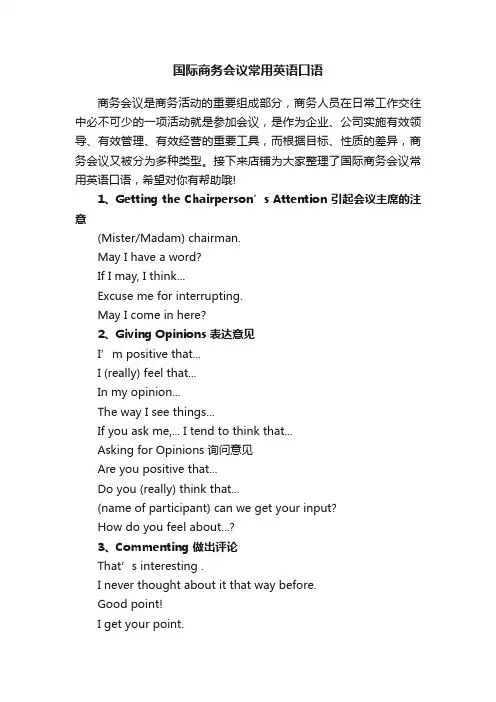
国际商务会议常用英语口语商务会议是商务活动的重要组成部分,商务人员在日常工作交往中必不可少的一项活动就是参加会议,是作为企业、公司实施有效领导、有效管理、有效经营的重要工具,而根据目标、性质的差异,商务会议又被分为多种类型。
接下来店铺为大家整理了国际商务会议常用英语口语,希望对你有帮助哦!1、Getting the Chairperson’s Attention 引起会议主席的注意(Mister/Madam) chairman.May I have a word?If I may, I think...Excuse me for interrupting.May I come in here?2、Giving Opinions 表达意见I’m positive that...I (really) feel that...In my opinion...The way I see things...If you ask me,... I tend to think that...Asking for Opinions 询问意见Are you positive that...Do you (really) think that...(name of participant) can we get your input?How do you feel about...?3、Commenting 做出评论That’s interesting .I never thought about it that way before.Good point!I get your point.I see what you mean.4、Agreeing 表示同意I totally agree with you.Exactly!That’s (exactly) the way I feel.I have to agree with (name of participant).5、Disagreeing 表示异议Unfortunately, I see it differently.Up to a point I agree with you, but...(I’m afraid) I can’t agree6、Advising and Suggesting 提出建议Let’s...We should...Why don’t you....How/What about...I suggest/recommend that...7、Clarifying 澄清Let me spell out...Have I made that clear?Do you see what I’m getting at?Let me put this another way...I’d just like to repeat that...8、Requesting Information 请求信息Please, could you...I’d like you to...Would you mind...I wonder if you could...9、Asking for Repetition 请求重复I’m afraid I didn’t understand that. Could you repeat what you just said?I didn’t catch that. Could you repeat that, please?I missed that. Could you say it again, please?Could you run that by me one more time?10、Asking for Clarification 要求澄清I don’t quite follow you. What exactly do you mean?I’m afraid I don’t quite understand what your are getting at.Could you explain to me how that is going to work?I don’t see what you mean. Could we have some more details, please?11、Asking for Verification 请求确认You did say next week, didn’t you? (’did’ is stressed)Do you mean that...?Is it true that...?12、Asking for Spelling 请求拼写Could you spell that, please?Would you mind spelling that for me, please?13、Asking for Contributions 请求赐教We haven’t heard from you yet, (name of participant).What do you think about this proposal?Would you like to add anything, (name of participant)?Has anyone else got anything to contribute?Are there any more comments?14、Correcting Information 更正Sorry, I think you misunderstood what I said.Sorry, that’s not quite right.I’m afraid you don’t understand what I’m saying.That’s not quite what I had in mind.That’s not what I meant.15、Keeping the Meeting On Target (time, relevance,decisions) 转入正题We’re running short of time.Well, that seems to be all the time we have today.Please be brief.I’m afraid we’ve run out of time.I’m afraid that’s outside the scope of this meeting.Let’s get back on track, why don’t we?That’s not really why we’re here today.Why don’t we return to the main focus of today’s meeting.We’ll have to leave that to another time.We’re beginning to lose sight of the main point.Keep to the point, please.I think we’d better leave that for another meeting.Are we ready to make a decision?。
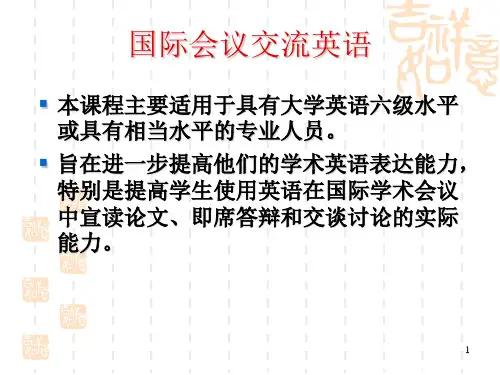
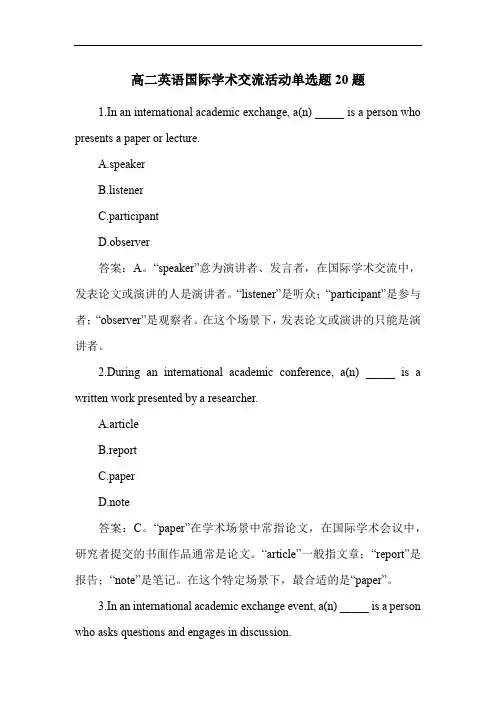
高二英语国际学术交流活动单选题20题1.In an international academic exchange, a(n) _____ is a person who presents a paper or lecture.A.speakerB.listenerC.participantD.observer答案:A。
“speaker”意为演讲者、发言者,在国际学术交流中,发表论文或演讲的人是演讲者。
“listener”是听众;“participant”是参与者;“observer”是观察者。
在这个场景下,发表论文或演讲的只能是演讲者。
2.During an international academic conference, a(n) _____ is a written work presented by a researcher.A.articleB.reportC.paperD.note答案:C。
“paper”在学术场景中常指论文,在国际学术会议中,研究者提交的书面作品通常是论文。
“article”一般指文章;“report”是报告;“note”是笔记。
在这个特定场景下,最合适的是“paper”。
3.In an international academic exchange event, a(n) _____ is a person who asks questions and engages in discussion.A.questionerB.debaterC.discussantD.opponent答案:C。
“discussant”意为讨论者,在国际学术交流活动中,提问并参与讨论的人是讨论者。
“questioner”仅仅是提问者;“debater”是辩论者;“opponent”是对手。
这个场景强调既提问又参与讨论,所以“discussant”更合适。
4.At an international academic symposium, a(n) _____ is a collection of research papers on a specific topic.A.anthologyB.proceedingsC.encyclopediaD.dictionary答案:B。
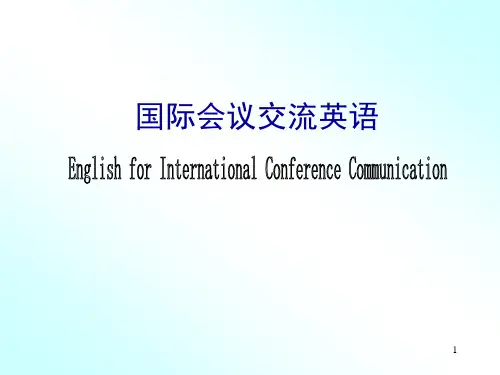
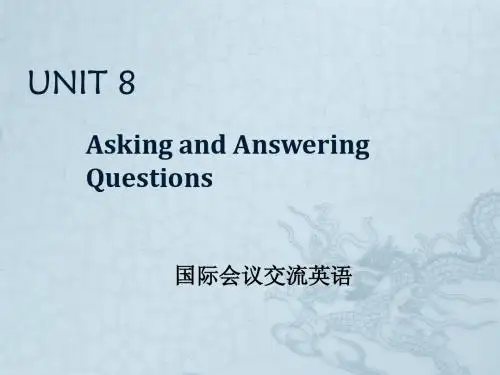
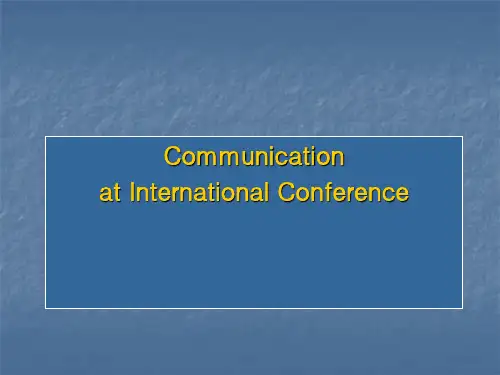
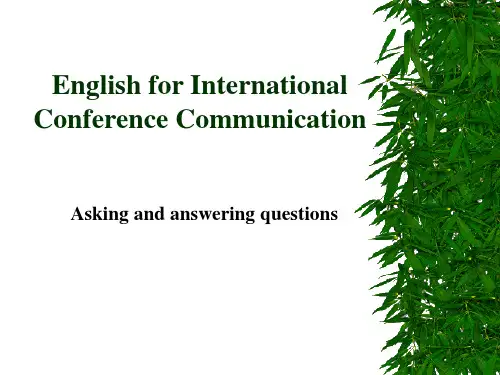

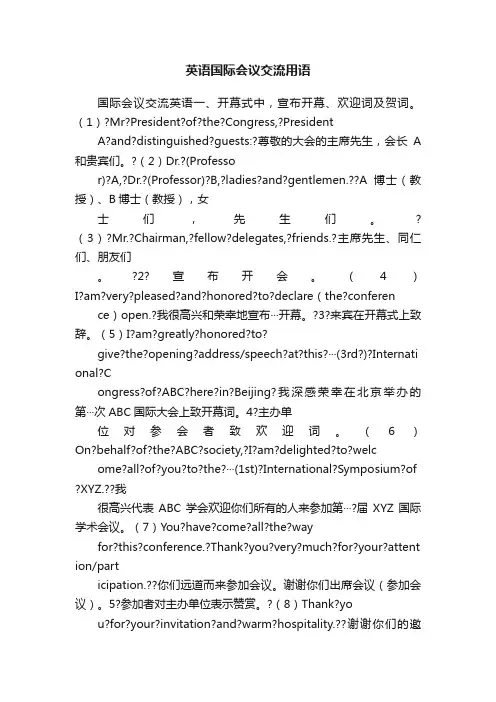
英语国际会议交流用语国际会议交流英语一、开幕式中,宣布开幕、欢迎词及贺词。
(1)?Mr?President?of?the?Congress,?PresidentA?and?distinguished?guests:?尊敬的大会的主席先生,会长A 和贵宾们。
?(2)Dr.?(Professor)?A,?Dr.?(Professor)?B,?ladies?and?gentlemen.??A博士(教授)、B博士(教授),女士们,先生们。
?(3)?Mr.?Chairman,?fellow?delegates,?friends.?主席先生、同仁们、朋友们。
?2?宣布开会。
(4)I?am?very?pleased?and?honored?to?declare(the?conferen ce)open.?我很高兴和荣幸地宣布···开幕。
?3?来宾在开幕式上致辞。
(5)I?am?greatly?honored?to?give?the?opening?address/speech?at?this?···(3rd?)?Internati onal?Congress?of?ABC?here?in?Beijing?我深感荣幸在北京举办的第···次ABC国际大会上致开幕词。
4?主办单位对参会者致欢迎词。
(6)On?behalf?of?the?ABC?society,?I?am?delighted?to?welc ome?all?of?you?to?the?···(1st)?International?Sympo sium?of XYZ.我很高兴代表ABC学会欢迎你们所有的人来参加第···?届XYZ国际学术会议。
(7)You?have?come?all?the?wayfor?this?conference.?Thank?you?very?much?for?your?attent ion/participation.??你们远道而来参加会议。
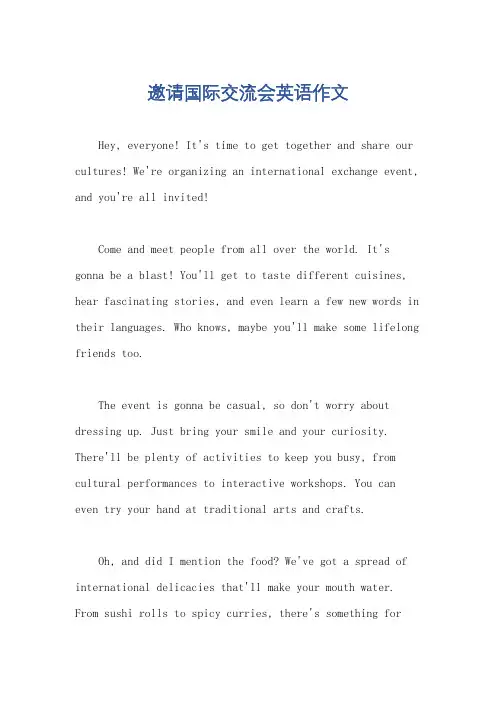
邀请国际交流会英语作文Hey, everyone! It's time to get together and share our cultures! We're organizing an international exchange event, and you're all invited!Come and meet people from all over the world. It's gonna be a blast! You'll get to taste different cuisines, hear fascinating stories, and even learn a few new words in their languages. Who knows, maybe you'll make some lifelong friends too.The event is gonna be casual, so don't worry about dressing up. Just bring your smile and your curiosity. There'll be plenty of activities to keep you busy, from cultural performances to interactive workshops. You can even try your hand at traditional arts and crafts.Oh, and did I mention the food? We've got a spread of international delicacies that'll make your mouth water. From sushi rolls to spicy curries, there's something foreveryone's taste buds.So, what are you waiting for? Grab your friends and come join us for a night of fun, learning, and cultural exploration! It's gonna be an experience you won't forget. See you there!。
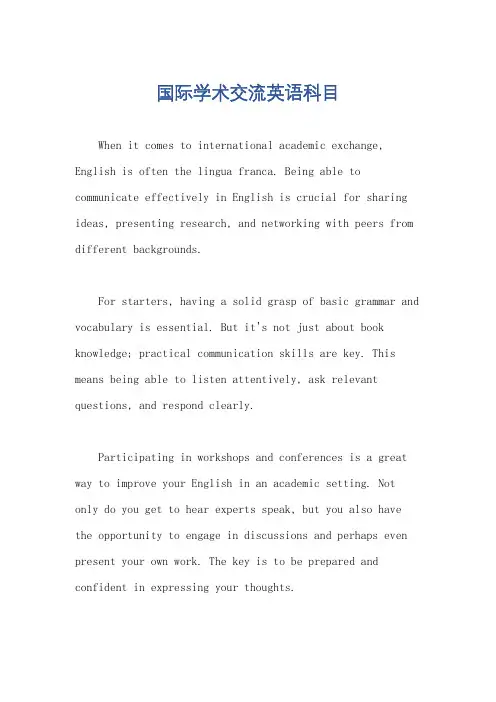
国际学术交流英语科目When it comes to international academic exchange, English is often the lingua franca. Being able to communicate effectively in English is crucial for sharing ideas, presenting research, and networking with peers from different backgrounds.For starters, having a solid grasp of basic grammar and vocabulary is essential. But it's not just about book knowledge; practical communication skills are key. This means being able to listen attentively, ask relevant questions, and respond clearly.Participating in workshops and conferences is a great way to improve your English in an academic setting. Not only do you get to hear experts speak, but you also have the opportunity to engage in discussions and perhaps even present your own work. The key is to be prepared and confident in expressing your thoughts.Collaborating with international colleagues can also be an enriching experience. Working on joint projects or research papers requires clear communication to ensure everyone is on the same page. It's a great opportunity to learn about different research methods and cultural perspectives.Finally, don't be afraid to make mistakes. Everyone learns by doing, and speaking English in an academic context takes practice. The more you engage, the more confident you'll become. So seize the opportunities, ask questions, and immerse yourself in the exchange of ideas.。